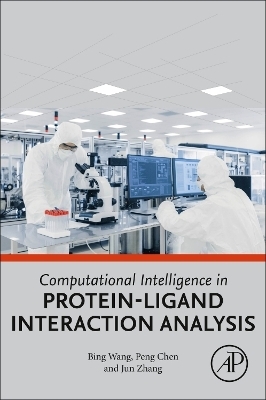
Computational Intelligence in Protein-Ligand Interaction Analysis
Academic Press Inc (Verlag)
978-0-12-824386-2 (ISBN)
Bing Wang is Dean in the School of Electrical & Electronics Information at Anhui University of Technology, in China. He received his PhD in bioinformatics from the University of Technology, China, on protein-protein interaction site prediction. He has held postdoctoral positions in machine learning, chemoinformatics, and biomedical information engineering at the Universities of Louisville and Vanderbilt, in the USA. He has published over 120 papers, is a senior member of IEEE, and serves on the editorial board of several journals. Peng Chen is a Professor in the Institute of Physical Science and Information Technology, and the School of the Internet, at Anhui University, China. He received his PhD from the University of Science and Technology of China (USTC). He has held international roles in Hong Kong, the USA, and Saudi Arabia. He was previously Associate Professor at the Hefei Institute of Intelligent Machines, with the Chinese Academy of Sciences. His research interests include machine learning, and data mining, and he has published over 100 papers. Jun Zhang is a Professor at Anhui University, China, and is an expert in the field of computational intelligence.
1. Computational intelligence methods in protein-ligand interactions
2. Random forest method for predicting protein ligand-binding residues
3. Encoders of protein residues for identifying protein-protein interacting residues
4. Identification of hot spot residues in protein interfaces from protein sequences and ensemble methods
5. Semi-supervised prediction of protein interaction sites from unlabeled sample information
6. Developing computational model to predict protein-protein interaction sites based on XGBoost algorithm
7. Evolutional algorithms and their applications in protein long-range contact prediction
8. A novel robust geometric approach for modelling protein-protein interaction networks
9. Prediction of protein-protein interactions from amino acid sequences with ensemble extreme learning machines and principal component analysis
10. Ensemble learning-based prediction on drug-target interactions
11. Convolutional neural networks for drug-target interaction prediction
12. Ensemble learning methods for drug-induced liver injury identification
13. Database construction for mutant protein interactions
14. A linear programming computational framework integrates phosphor-proteomics and prior knowledge to predict drug efficacy
| Erscheinungsdatum | 05.03.2024 |
|---|---|
| Zusatzinfo | 60 illustrations (30 in full color); Illustrations |
| Verlagsort | San Diego |
| Sprache | englisch |
| Maße | 152 x 229 mm |
| Gewicht | 450 g |
| Themenwelt | Mathematik / Informatik ► Informatik ► Theorie / Studium |
| Naturwissenschaften ► Biologie ► Genetik / Molekularbiologie | |
| ISBN-10 | 0-12-824386-4 / 0128243864 |
| ISBN-13 | 978-0-12-824386-2 / 9780128243862 |
| Zustand | Neuware |
| Haben Sie eine Frage zum Produkt? |
aus dem Bereich


